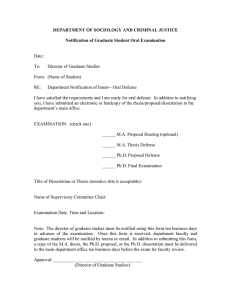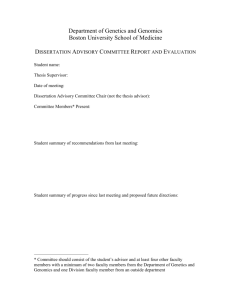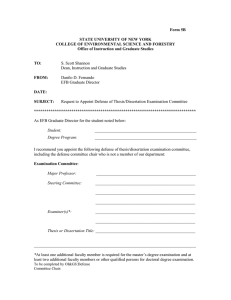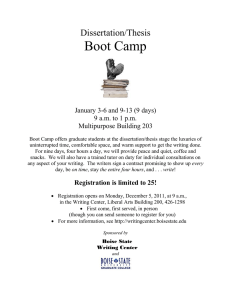Department of Biodiversity, Earth and Environmental Science Graduate Student Handbook
advertisement
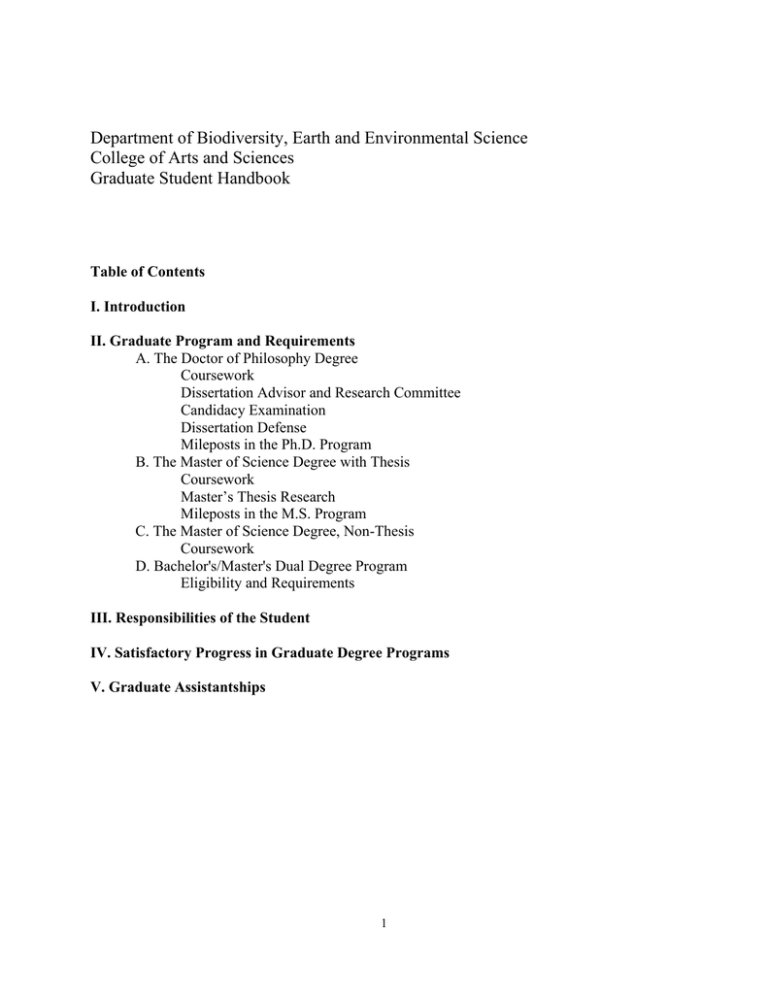
Department of Biodiversity, Earth and Environmental Science College of Arts and Sciences Graduate Student Handbook Table of Contents I. Introduction II. Graduate Program and Requirements A. The Doctor of Philosophy Degree Coursework Dissertation Advisor and Research Committee Candidacy Examination Dissertation Defense Mileposts in the Ph.D. Program B. The Master of Science Degree with Thesis Coursework Master’s Thesis Research Mileposts in the M.S. Program C. The Master of Science Degree, Non-Thesis Coursework D. Bachelor's/Master's Dual Degree Program Eligibility and Requirements III. Responsibilities of the Student IV. Satisfactory Progress in Graduate Degree Programs V. Graduate Assistantships 1 Introduction The Department of Biodiversity, Earth and Environmental Science (BEES) offers graduate programs leading to the Doctor of Philosophy degree and to the Thesis or Non-thesis Master of Science degree. The curricula are designed to provide students with advanced coursework, introduce students to the current scientific literature, as well as prepare students for scientific communication. These classes will expand students' knowledge, analytical ability, and use of the scientific method. Thesis research provides the opportunity to utilize and expand these abilities while addressing a novel scientific question. The intellectual life of the department relies heavily on the participation, creativity, and energy of graduate students in addressing these questions. Publishing manuscripts is expected since it provides both an indication of successful learning and implementation of the scientific method and a necessary milestone for future advancement in science. In addition to being mentored by a professor, seminars and informal discussions provide a rich, interactive environment in which students can develop. This handbook has been designed to provide guidance to current and prospective graduate students, as well as to address common questions regarding departmental programs. Students are expected to familiarize themselves with the policies herein. Graduate Student Forms – PhD students have a number of forms (i.e. D1 – D5) that need to be completed as they progress through the program. All forms referenced in this handbook can be found on the Office of Graduate Studies website at www.drexel.edu/provost/graduatestudies/ under Forms, Doctoral Student Forms. M.S. Thesis students should consult the Graduate Advisor for appropriate forms. All forms must be submitted to the BEES Department prior to being forwarded to the Office of Graduate Studies. Special circumstances – The department’s Graduate Committee recognizes that deviation from the guidelines presented in this handbook may be necessary in special circumstances. Graduate students and/or their faculty advisors may petition the Graduate Committee for exemptions to the prescribed rules and schedules. Exemptions that conflict with university policy will not be granted. 2 Graduate Programs and Requirements The Doctor of Philosophy Degree The Doctor of Philosophy (Ph.D.) degree is the terminal degree for students who wish to eventually pursue a leadership role in academic, governmental or industrial settings. Besides having the necessary academic background, students in the PhD ENVS program have research interests that are a good fit with the research activity occurring within the department. Students are admitted directly into a lab with an identified faculty research advisor upon entering the program (as oppose to conducting laboratory rotations to determine lab placement). In accordance with university policy, students who enter the program with a master’s degree (post-masters status) must complete 45 credits of coursework and/or research. Students entering the program with a bachelor’s degree (post-baccalaureate status) must complete 90 credits. Typically the focus of the first 12-24 months in the program is on completing coursework and developing a dissertation topic together with your faculty mentor. By the end of the first or second year all Ph.D. students must have completed their candidacy examination (details below). After successful completion of the candidacy examination, students will devote their efforts to the completion of an original research project. The results of the student’s research must be of sufficient quality to be publishable in mainstream, peer-reviewed scientific journals. Progress towards these degree requirements is overseen and guided by the faculty advisor, the faculty research committee, and the graduate program committee. Coursework It is important for each student to be particularly conversant at an advanced level in ecology and evolution. Therefore, during the first year of study there is a flexible core curriculum that provides a strong understanding of advanced concepts in these disciplines. The second year provides a range of more advanced and specialized courses through electives that are chosen in consultation with the student’s Dissertation Research Advisor and Dissertation Research Committee. Although there are advanced courses in ecology that students are generally expected to complete, PhD students are advised individually by their faculty advisor and research committee whereby an individualized course sequence will be recommended, taking into account the student’s existing knowledge, fields of study, and research and career goals. Students register for classes and/or research 9 months out of the year (Fall, Winter & Spring quarters). All students take 6 credits per quarter in the first year. In the second year, postbaccalaureate students take 9 credits per term and post-masters students take 6 credits per term. Post-baccalaureate students are required to obtain 45 credits by the end of their 2nd year, students entering with a Master’s degree are required to complete 15 credits by the end of their 1st year. After completing the required coursework, students generally fulfill the credit requirements of a full-time graduate student by registering for research credit. Students must maintain a cumulative grade point average (GPA) of at least a 3.0. The progress of each student is reviewed each term by the Office of Graduate Studies. Failure to maintain a minimum 3.0 cumulative GPA will result in the student being placed on academic probation and may result in the loss of the student’s research or teaching assistantship. For students placed on probation they must, during the following two academic quarters: 1) earn a 3.0 or better in each term and 2) achieve a cumulative GPA of at least a 3.00. Failure to meet either of these requirements will result in the dismissal of the student from graduate studies at 3 Drexel University. Graduate students must have a minimum 3.00 cumulative GPA in order to graduate, i.e. students cannot graduate while on academic probation. Required Seminars All Ph.D. and M.S. (Thesis) graduate students are required to attend the Departmental Seminar on Thursdays from 3:30pm – 4:50pm. With the exception of first and final year students, all PhD students are required to present a seminar once per academic year. Second and third year students will give 15-20 minute seminars, while fourth year student will give 30-45 minute seminars. Unless otherwise recommended by the faculty advisor, students in their final year (usually fifth year) do not give a seminar since they will defend their thesis. A schedule will be generated by the beginning of the fall term. Dissertation Advisor and Research Committee Selecting a dissertation advisor is a very important step in the career of PhD students, since their thesis mentor will be directly advising them for the next 3-5 years as well as advising students throughout their professional careers. In our program, first year PhD students are recruited directly into specific faculty laboratories during the admission process. In consultation with the Dissertation Advisor, a Committee will be selected to guide the progress of the Ph.D. student. For students entering with a Master’s degree, this committee must be formed and meet by the end of the spring quarter of the first year. For students entering with a Bachelor’s degree, this committee must be formed and meet by the end of the fall quarter of the second year. The five-member committee must include at least three tenured or tenure track faculty members with their primary appointment in the BEES department, one of whom is the student's Dissertation Advisor. At least two of the committee members must be from outside the student’s major research area. At least one of the committee members must be from outside the student’s department. The Chair of the Dissertation Research Committee will be one of the departmental faculty members on the committee, other than the Dissertation Advisor. It is recommended that the Chair be a tenured faculty member whenever possible, but must be a tenure-track faculty member. The committee must be approved by the Graduate Program Committee and the Department Head. Recognizing that there may be reasons for committee composition to deviate from the above model, the student and advisor may petition the Graduate Committee to modify the guidelines on an individual basis. The student will conduct dissertation research under the direct supervision of the Dissertation Advisor and general guidance of the Dissertation Research Committee. The Dissertation Research Committee must be convened at least once per year to assess whether the student is making satisfactory progress toward the degree. If possible, this meeting should correspond to the student’s required annual Graduate Research Seminar presentation. It is important to schedule the first meeting of the Dissertation Research Committee promptly, it is a key factor in scheduling your candidacy examination. Prior to the first meeting of the Dissertation Research Committee, the student will prepare with the Dissertation Advisor a revised Plan of Study (Form D1). At the first dissertation committee meeting, the student should make a presentation to the committee that outlines the proposed dissertation project. This project will form the basis of the candidacy examination. The committee will provide feedback on the specifics of the proposed dissertation project. At the same time, the committee will describe the "knowledge areas" that students should have advanced knowledge in. Students will be expected 4 to have command of facts, experimental approaches and the latest findings of these areas for the candidacy examination. The Ph.D. Candidacy Examination The function of the Candidacy Examination is to test the breadth and the depth of the student's capabilities in their chosen area of study. The graduate student becomes a Ph.D. Candidate only after successfully completing the Candidacy Examination and completing 15 or 45 credits (for post-master’s or post-bachelor’s degree students, respectively). Students entering the program with a Master’s degree are expected to complete the candidacy examination by mid-summer quarter of their first year. Students entering the PhD program with a Bachelor’s degree are expected to complete this examination by mid-summer quarter of their second year. Part-time students will take the Candidacy Examination at a time recommended by their Dissertation Research Committee. The Candidacy Examination will be conducted by the student's Doctoral Candidacy Committee, which will be comprised of the Dissertation Research Committee and any additional members deemed necessary by the Dissertation Research Committee. Students should convene a meeting of the dissertation research committee as early as possible to propose a dissertation project (by spring at the latest). The committee will give the student valuable feedback on the proposed project that the student should consider thoroughly. In addition, the committee will describe the "knowledge areas" that students should have advanced understanding of. Students will be expected to have command of facts, experimental approaches and the latest findings of these areas for the candidacy examination. Finally, in consultation with their dissertation committee, students should schedule the candidacy exam at least 4 weeks in advance of the oral exam. The candidacy exam is comprised of three parts whose order will be determined by the Candidacy Committee: 1. Written Examination. At the end of the first year for post-master students and at the end of the second year for post-bachelor students, students will be assessed on their ability to answer questions related to their proposed dissertation project. The duration, content, & format of the written examination will be determined by the committee. Typically 1-4 questions per faculty examiner are asked, and there are generally 3 faculty examiners (excluding the advisor). The examination takes the form of a “take-home” examination. The questions will be appropriate for the student’s research interests and background, but must be sufficiently diverse to demonstrate the student's depth and breadth of knowledge. Students must submit their answers to the committee no later than two weeks before the Oral Candidacy Examination and orally defend their responses at the oral exam. 2. Dissertation Research Proposal. The student will also prepare a proposal of their anticipated dissertation research project. The proposal will be in the format of a predoctoral/postdoctoral fellowship proposal to NIH or NSF. The format of these proposals has changed recently and is now 6 pages in length, excluding references. Please check the NIH/NSF websites for the latest format constraints. It is expected that the student will have been developing the proposal in consultation with the Dissertation Advisor and Committee. The proposal must be distributed to the Candidacy Committee at least one week prior to the oral examination. It is anticipated that upon 5 completion of Candidacy, this proposal will be submitted to the appropriate funding agency for consideration. 3. Oral Examination. The student will give a seminar-type presentation to the examination committee: first) covering answers to the written examination; and second) detailing the dissertation proposal and any preliminary results. Committee members will question the student on topics presented in the presentation and proposal, as well as “knowledge area” topics. The questioning may be broadened to include basic knowledge of the student’s discipline(s) or of science in general. 4. Assessment - Based on a student’s performance on all three aspects of the candidacy exam, a grade of pass, revise, or fail will be given. The intent of the exam is to test the ability to synthesize material, to solve problems, and on ability to complete research and interpretation of results related to the chosen research topic. If a student is asked to revise either dissertation proposal and/or the written examination, then the committee will give the student specific comments on the material and the student must revise the document within two weeks of the exam. There is a limit of two rounds of revision; students that do not make satisfactory progress in these revisions after two rounds will fail the exam. If a student should fail the Candidacy Examination, the student may retake the examination once, but there must be a minimum 3-month period between the exams. A second failure will result in the termination of the student from the degree program. Upon notification of termination from the program, the student can petition the Graduate Committee to be permitted to complete a Non-thesis Masters degree, provided they meet the credit requirements. Once a student passes the candidacy exam they become a Doctoral Candidate. The chair of the committee must submit Forms D2 and D2A’s (one for each committee member) to the Graduate Advisor and to the Office of Graduate Studies. Dissertation. The student will finalize their Dissertation only after approval to write is granted by the Dissertation Research Committee. Approval will be based upon an evaluation of the breadth and depth of original research being conducted by the student. The dissertation must follow the format specifications set forth by Drexel’s Office of Graduate Studies located on the Hagerty Library website under Thesis Manual. Formal appointment of the Dissertation Research Committee follows submission of Form D3 to the Graduate Advisor and to the Office of Graduate Studies. Dissertation Defense. Research conducted for the Dissertation must be presented in a lecture open to the public and then defended, privately, before the student's Dissertation Research Committee. The Dissertation defense must be scheduled with the Office of Graduate Studies four weeks in advance, using Form D4. A final draft of the dissertation must be given to all committee members two weeks prior to the defense and a public notice of the defense lecture posted one week before the defense. The committee members are free to examine at length the research as reported in the Dissertation, as well as the student's overall competence. The student must pass this exam (with the assent of at least four fifths of the committee members) and submit Form D5 to the Graduate Advisor. Within two-three weeks, the fully corrected written 6 dissertation (following Thesis Manual guidelines) must be submitted to the library before the Doctoral Degree can be officially conferred. Mileposts in the Ph.D. Program 1. 2. 3. 4. 5. Selection of Dissertation Advisor - Students are admitted to an identified Dissertation Advisor’s lab starting in the Fall of their first year. Committee - Dissertation Research Committee constituted by end of the first year. Coursework - Core coursework must be completed within the first two years of study, unless the Dissertation Research Committee requires otherwise. Exam - The Candidacy Examination successfully completed by the end of the first or second year depending on if the student is post-MS or post-BS. Dissertation - Each Ph.D. student is expected to complete their dissertation defense within 5 years. Drexel University requires that the dissertation be finished within 7 years. 7 B. The Master of Science Degree with Thesis The Master’s degree with thesis is for students interested in advanced graduate coursework and experience in completing an original research project. Students should choose a research advisor during their first quarter. During the first year, students begin their original research project. The findings of this work should be publishable in a peer-reviewed scientific journal. Progress towards these degree requirements is overseen and guided by the selected Thesis Advisor, the Thesis Research Committee, and the Graduate Program Committee. Coursework The Master’s degree requires 45 credits beyond the Bachelor's degree, up to 12 credits of which may be credits for research and thesis. The first step is to submit a plan of study suited to your individual needs through the Graduate Advisor. Master’s Thesis Research Committee. Research for the thesis is conducted under the guidance of the student's Thesis Advisor and Thesis Research Committee. The Thesis Advisor must be a faculty member in the department and must agree to serve as advisor. The student's Committee consists of at least three faculty members, of which at least two are from the Department. The Chair of the Thesis Committee shall be a departmental tenure-track faculty member who is not the thesis advisor and preferably tenured. Research. The student will conduct thesis research under the direct supervision of the Thesis Advisor and general guidance of the Thesis Research Committee. The Thesis Research Committee must be convened at least once per year to assess whether or not the student is making satisfactory progress toward the degree. One of these meetings will coordinate with the student’s annual Graduate Research Seminar presentation. Thesis Proposal. Within one year of entering the program, the student must orally present and defend their Master Thesis proposal to the Thesis Research Committee. Committee members may examine the M.S. student on subject matter related to their thesis project. Submit Proposal Approval Form to the Graduate Advisor. Thesis. Students will finalize their Thesis only after approval is granted by the Thesis Research Committee. Approval will be based upon an evaluation of the breadth and depth of original research being conducted by the student. Thesis Defense. Research conducted for the Thesis must be presented in a lecture open to the public and then defended, privately, before the student's Thesis Research Committee. The Thesis defense must be scheduled with the Departmental Office four weeks in advance, a final draft of the thesis given to all committee members two weeks prior to the defense and a public notice of the defense lecture posted one week before the defense. The committee members are free to examine at length the research as reported in the Thesis, as well as the student's overall competence. The student must pass this exam (with the assent of at least two thirds of the committee members) and the Thesis must be submitting to the Library (following the Thesis Manual guidelines) before the student will receive the M.S. degree. 8 Any student passing the Master's thesis defense may apply to transfer to the Departmental Ph.D. program through the departmental Graduate Advisor. The application will be forwarded to the Graduate Committee for their recommendation to the Department Head. Mileposts in the M.S. Thesis Program 1. 2. 3. 4. 5. Advisor - Students must be accepted into the laboratory of their Thesis Advisor by the end of the first quarter. Committee - Thesis Research Committee must be constituted by the end of the second quarter. Proposal - Thesis Proposal acceptance by the Thesis Research Committee must be successfully completed by the end of the first year. Coursework - Coursework must be completed in the first two years of study, unless the Thesis Research Committee requires otherwise. Thesis - Each M.S. student is expected to complete his/her thesis defense within 3 years. Drexel University requires that the thesis be finished within 5 years. 9 C. The Master of Science Degree, Non-Thesis The non-thesis master’s degree is a coursework-based degree for those looking to advance in their fields, but not desiring direct research experience. Coursework This degree requires 45 credits beyond the Bachelor's degree. A maximum of 6 credits for independent research (either library or laboratory work, under direction of a faculty member from the Department) may be counted toward the degree. The courses that are applicable to this degree must be approved by the Departmental Graduate Advisor. Annual meetings with the Departmental Graduate Advisor are required. The first step is to submit a Plan of Study suited to your individual needs through the Graduate Advisor. 10 D. Bachelor's/Master's Dual Degree Program The Bachelor's/Master's Dual Degree Program allows exceptionally qualified students in Environmental Science to earn both a bachelor's degree and a master's degree in the time normally required for the undergraduate degree alone. The program is intense since it requires graduate courses to be taken within the 5 year Coop timeframe in order to complete the requirements of both degrees in the time allotted. Interested students should see the Graduate Advisor for more specific details. Application Exceptional students with a Drexel cumulative grade point average of 3.0 overall and minimum 3.25 in science and math courses are eligible to apply. Although students officially apply to the Graduate Committee after they have completed 90 undergraduate credits and before they have completed 120 credits (which is normally during the pre-junior year), students need to begin planning for entry as early as their freshman year. Students must submit a Personal Statement and have a faculty interview as part of the admission review process. Changes in the BS Program Students generally need to take larger course loads by their sophomore year in order to make room for graduate courses in the later years. Several courses normally taken in the senior year will be taken in the junior year. The requirements for the BS degree will be 180 credits accomplished by not requiring free elective credit beyond 180 total credits. MS Program Requirements It is anticipated that most BSMS students will follow the non-thesis option as outlined above. The non-thesis option requires 45 graduate credits. Up to 6 credits of ENVS 797 Research can be included in the non-thesis option. A thesis option is available if a faculty member has agreed to serve as thesis advisor at the time of acceptance into the BSMS program. In the thesis option, up to 12 credits of research can be included among the course requirements. A student can petition the Graduate Program Committee to allow a greater number of research credits. 11 III. Responsibilities of the Student Submission of a Plan of Study. A plan of study is a description of the courses a student intends to take to fulfill their degree requirements. All graduate students must have an approved and current Plan of Study filed with the Department. Department curriculum sheets (or Plans of Study) listing the program’s core requirements in the first year should be used prior to formal submittal of Form D1 at the end of the first year. All forms must be submitted to the Graduate Advisor, who will file a copy with the Office of Graduate Studies. Proposal. It is the responsibility of the Ph.D. student to propose (in written form), plan, carry out and write up the research results in a doctoral dissertation format. It is the responsibility of the Thesis Masters student to propose (orally), plan, carry out and write up the research results in a Master’s thesis format as outlined in Haggerty Library’s Thesis Manual. Research Committee Meetings. Students in either the Thesis Masters or Doctoral Program must have at least one committee meeting per year and present a research seminar each academic year in a department wide forum discussing their research (results obtained to date, methodological quandaries and plans for future work). The setting for this presentation can be the Graduate Student Research Seminar, provided that the Dissertation Committee attends. For Ph.D. students, a written thesis proposal serves as the basis of the Candidacy examination at the end of the second year. Progress in these responsibilities will be evaluated by student’s thesis or dissertation committees. Research Publications. It is expected that the completion of a Ph.D. dissertation will be accompanied by the production of at least two scientific manuscripts, suitable for publication in peer-reviewed journals. Students are also encouraged to prepare a review manuscript for publication based on their research area. This will be an extension of their thesis or dissertation literature review. It is anticipated that the completion of a M.S. (thesis) degree will be accompanied by the preparation of at least one scientific manuscript suitable for publication in a peer-reviewed journal. With the agreement of the Thesis Research Committee, this is not required. 12 IV. Satisfactory Progress in the Ph.D. or M.S. Degree Program In order to track the progress being made by graduate students, assure that students are, indeed, making progress toward their degrees, and provide regular feedback for students, the following progress assurance and tracking program which is required for all students in Ph.D. or Masters with thesis programs. 1) Students must meet their Dissertation/Thesis Research Committee at least once each year to discuss their progress (e.g. courses completed, exams taken, research goals attained, etc.). 2) After this meeting, the Dissertation/Thesis Research Committee must notify the student and the Graduate Advisor in writing whether the committee believes the student is making satisfactory progress toward their degree. If the Dissertation/Thesis Research Committee determines that the student is not making adequate progress, it must detail what difficulties it sees and what must be done to remedy those difficulties. The Chair of the Dissertation/Thesis Research Committee will file a Graduate Student Progress Report with the Department Graduate Advisor. 3) If a student's Dissertation/Thesis Research Committee decides the student is not making satisfactory progress, then the student is placed on probation. The student must then reconvene their Dissertation/Thesis Research Committee in the next quarter to reconsider the student’s progress. Two successive reports of unsatisfactory progress will subject the student to corrective/disciplinary action, as recommended by their Dissertation/Thesis Research Committee to the Graduate Program Committee and the Department Head. Such action may include loss of eligibility for departmental financial support, probationary status or dismissal from the program. In addition, the Graduate Program Committee will consider the student’s progress reports in making recommendations for TA/RA appointments. 4) It is the student's responsibility to schedule the meetings with their Research Committee and provide the documentation of progress. Failure to meet with the Research Committee or provide the evidence of progress will also place the student on probation. Questions regarding the applicability of the requirements described in this handbook or deviations from those requirements should be referred to and will be arbitrated by the Graduate Program Committee. 13 V. GRADUATE ASSISTANTSHIPS Purpose The purposes of graduate assistantships are to support the teaching and research functions of the Department and to support the education of graduate students. Assistantships shall be awarded primarily on the basis of academic ability and performance. Appointment to teaching assistantships shall also require the ability to teach effectively. The effectiveness of TA teaching will be assessed quarterly. Appointment procedure 1. Teaching assistantships (TAs) will be awarded to Ph.D. candidates and, whenever possible, will be made during spring term for the following academic year. Research assistantships (RAs) will be awarded by individual faculty members whom are principal investigators holding grants and/or contracts. 2. The Graduate Program Committee will recommend to the Department Head candidates for graduate teaching assistantships (TAships) from among those who have applied for such appointments. Regular (full-time) TAships are normally awarded on a yearly basis and teaching assignments will be scheduled for 3 academic quarters. 3. Reappointment is subject to review of the student's teaching /research effectiveness by faculty and students, academic performance, satisfactory progress towards their degree, and active participation in departmental seminar series and departmental research activities. TAships can be revoked after suitable warning if it is the determination of the Graduate Program Committee and the Department Head that the student is not performing their duties in a satisfactory way. 4. The Graduate Program Committee shall maintain a prioritized list of applicants who may be available as TAs in the event that additional teaching assistants are required. Such ad hoc appointments are made on a quarter-by-quarter basis. Criteria for Graduate Teaching Assistantships 1. TA support is dependent on the graduate student’s academic standing, student and faculty teaching evaluations, satisfactory progress towards their degree, and active participation in departmental seminar series and departmental research activities. 2. Regular (full time) TAships are awarded only to full time Ph.D. students. 3. During the Fall term, new TAs are required to take EDUC 775 Teaching Assistantship to support their college teaching. This is a 1 credit course which carries no tuition charges. 4. All international students with a Teaching Assistantship are required to have the 14 ACTFL Oral Proficiency Interview (OPI) which tests for oral proficiency. This interview is given as part of the ITA Program or upon your arrival to Drexel. Students must successfully pass the OPI interview by the end of their third term in order to qualify as making satisfactory progress in the PhD program. Failure to receive an OPI score of Intermediate High by the end of spring term of first year will result in loss of TA funding and possible dismissal from the PhD program. 5. New, entering Ph.D. students are guaranteed a TA position for their first two years in the graduate program, assuming they maintain satisfactory progress academically and receive satisfactory teaching evaluations. 6. Post-candidacy Ph.D. students are eligible for TA positions when research assistantships are not currently available in the thesis laboratory. 7. Assignment of TA’s to specific courses shall be judged based on academic record, GRE and TOEFL scores (international students), letters of recommendation, and the personal statement in the graduate application. 8. Faculty can notify the Graduate Program Committee of applicants with special skills needed to teach particular courses. 9. TA appointments will be made in such a manner as to capitalize on students’ background and knowledge base as much as possible. Assignment and Duties of Teaching Assistant 1. Teaching assistantships are awarded on a competitive basis by the Department Head from a prioritized list maintained by the Graduate Committee. 2. Duties of TAs shall be established by the supervising faculty member in consultation with the TAs at the beginning of each quarter. 3. The activities required for a regular (full-time) assistantship require 20 hours/week on average. 15

